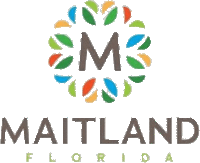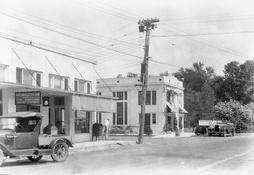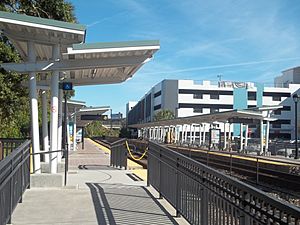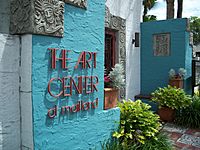Maitland, Florida facts for kids
Quick facts for kids
Maitland, Florida
|
||
|---|---|---|
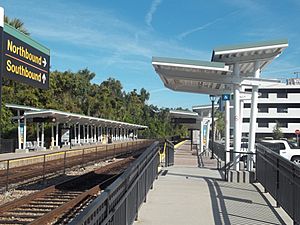
Maitland station
|
||
|
||
| Motto(s):
A Community For Life
|
||
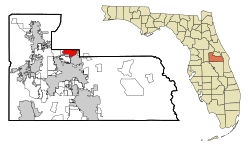 |
||
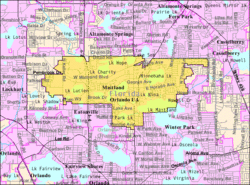
U.S. Census map
|
||
| Country | ||
| State | ||
| County | Orange | |
| Incorporated (Town) | July 17, 1885 | |
| Incorporated (City) | June 1, 1959 | |
| Area | ||
| • Total | 6.48 sq mi (16.78 km2) | |
| • Land | 5.36 sq mi (13.88 km2) | |
| • Water | 1.12 sq mi (2.89 km2) | |
| Elevation | 75 ft (23 m) | |
| Population
(2020)
|
||
| • Total | 19,543 | |
| • Estimate
(2021)
|
18,959 | |
| • Density | 3,646.08/sq mi (1,407.78/km2) | |
| Time zone | UTC-5 (Eastern (EST)) | |
| • Summer (DST) | UTC-4 (EDT) | |
| ZIP codes |
32751, 32794
|
|
| Area code(s) | 407, 689 | |
| FIPS code | 12-42575 | |
| GNIS feature ID | 2405000 | |
Maitland is a city in Orange County, Florida, United States. It is part of the larger Greater Orlando area. In 2020, about 19,543 people lived there.
Maitland has a rich history, which you can explore at the Maitland Historical Museum. The city also has the Maitland Art Center, known for its unique buildings. You can also visit the Maitland Telephone Museum and the William H. Waterhouse House Museum. These places are now managed by the Art & History Museums of Maitland. A SunRail train station is located in Maitland on Highway 17–92. The city gets its name from Fort Maitland.
Contents
History of Maitland, Florida
Maitland is one of the oldest towns in central Florida. Long ago, the Timucuan Native Americans lived in this area.
Early Beginnings and Naming
The town was named after a nearby lake. This lake honored Captain William Seton Maitland. He was a soldier who fought in the Second Seminole War. He died in the battle of Wahoo Swamp.
In 1838, a small military outpost was built. It was on the western shore of Lake Fumecheliga. This lake is now known as Lake Maitland. This happened during the Second Seminole War.
Growth After the Civil War
After the American Civil War, new people moved to the area. Christopher Columbus Beasley was one of the first permanent settlers. He arrived at Lake Maitland in 1871. A post office opened in his home on January 2, 1872. A small town began to grow around this post office.
In the late 1800s, the area became known for growing citrus fruits.
Becoming a Town and City
Lake Maitland officially became a town in 1885. It was the third town in Orange County to do so. At first, Lake Maitland was a quiet, rural village. Its streets were lined with large oak trees.
In the mid-1920s, the town started to modernize quickly. This happened as Orlando's growth reached Maitland. Many new houses and roads were built during this time. In 1959, Maitland officially became a city.
Historical Places in Maitland
Maitland is a suburb of Orlando. The city has a "historical corridor" with old homes. These homes are still standing and lived in today. They are found in the Lake Lily-Lake Catherine area.
Some of these old buildings are over 100 years old. They include the "Church of the Good Shepherd" (built in 1883). Also, there's the "William H. Waterhouse House" (1884). The Maitland Public Library (1907) and the "Maitland Art Center" (1937) are also historic.
Maitland has always been a popular vacation spot. This is because of its nice weather and many lakes. People enjoy boating on these lakes.
Geography and Lakes of Maitland
Maitland is located at 28°37′37″N 81°22′1″W / 28.62694°N 81.36694°W.
The city covers about 6.48 square miles (16.78 square kilometers). About 5.36 square miles (13.88 square kilometers) is land. The rest, about 1.12 square miles (2.89 square kilometers), is water.
Maitland has 21 lakes in total. The biggest one is Lake Maitland, which is 451 acres.
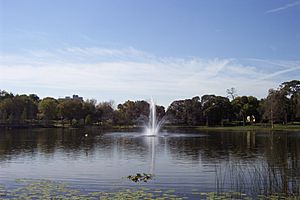
Population and People of Maitland
| Historical population | |||
|---|---|---|---|
| Census | Pop. | %± | |
| 1900 | 136 | — | |
| 1910 | 157 | 15.4% | |
| 1920 | 172 | 9.6% | |
| 1930 | 511 | 197.1% | |
| 1940 | 463 | −9.4% | |
| 1950 | 889 | 92.0% | |
| 1960 | 3,570 | 301.6% | |
| 1970 | 7,157 | 100.5% | |
| 1980 | 8,763 | 22.4% | |
| 1990 | 9,110 | 4.0% | |
| 2000 | 12,019 | 31.9% | |
| 2010 | 15,751 | 31.1% | |
| 2020 | 19,543 | 24.1% | |
| 2022 (est.) | 19,356 | 22.9% | |
| U.S. Decennial Census | |||
Maitland's population has grown a lot over the years. In 1900, only 136 people lived there. By 2020, the population was 19,543.
Diversity in Maitland
The city is home to people from many different backgrounds. Here's a look at the racial makeup of Maitland in 2020:
| Race | Pop 2010 | Pop 2020 | % 2010 | % 2020 |
|---|---|---|---|---|
| White | 11,595 | 12,360 | 73.61% | 63.25% |
| Black or African American | 1,657 | 2,194 | 10.52% | 11.23% |
| Native American or Alaska Native | 17 | 24 | 0.11% | 0.12% |
| Asian | 538 | 881 | 3.42% | 4.51% |
| Pacific Islander or Native Hawaiian | 5 | 4 | 0.03% | 0.02% |
| Some other race | 35 | 249 | 0.22% | 1.27% |
| Two or more races/Multiracial | 262 | 771 | 1.66% | 3.95% |
| Hispanic or Latino (any race) | 1,642 | 3,060 | 10.42% | 15.66% |
| Total | 15,751 | 19,543 |
Households and Families
In 2020, there were 7,510 households in Maitland. About 22.1% of these households had children under 18. Many households were married couples living together (44.6%).
The average household had 2.34 people. The average family had 2.93 people.
Age and Income
In 2020, about 23.7% of the population was under 18 years old. The median age in the city was 36.6 years.
The median income for a household in Maitland was $79,821. For families, the median income was $100,978.
Economy and Jobs in Maitland
The Maitland Center was created in 1982. It is located next to Interstate 4. Today, this area has over 400 businesses. It also has more than 45 office buildings.
Worldwide Brands has its main office in Maitland.
Major Employers
Other important employers in the area include:
- Sonny's Real Pit Bar-B-Q
- Fidelity Integrated Financial Solutions
- Charles Schwab Corporation
- The Timothy Plan, an investing company.
Transportation
SunRail is a regional commuter rail service. It has a passenger rail station in Maitland. The first part of the system opened on May 1, 2014.
Culture and Fun in Maitland
Maitland is home to the Enzian Theater. This is Central Florida's only full-time independent movie theater. It also hosts the Florida Film Festival.
Museums and Art
Maitland is also home to the Art & History Museums – Maitland. This includes the Maitland Art Center. It is a National Historic Landmark because of its unique buildings. These buildings look like Mayan Revival architecture and Fantasy architecture.
Other museums include:
- The Maitland Historical Museum
- The Maitland Telephone Museum
- The William H. Waterhouse House Museum
- The Carpentry Shop Museum
Maitland also has The Roth Family Jewish Community Center. It is a center for Jewish life in Orlando. It welcomes people from all backgrounds.
Sports and Recreation
In August 2005, the Maitland Little League team did very well. They made it to the semifinals of the 2005 Little League World Series.
Education in Maitland
Orange County Public Schools manages the public schools in Maitland.
Public Schools
- Dommerich Elementary School
- Lake Sybelia Elementary School
- Maitland Middle School
Private Schools
- Maitland Montessori School
- Jewish Academy of Orlando
- Orangewood Christian School
- Park Maitland School
- King of Kings Lutheran School (K3–8)
Higher Education
For older students, there are also universities:
- Everglades University
- University of Phoenix-Orlando
Places to Visit in Maitland
Maitland has many interesting places to visit:
- Maitland Art Center
- Enzian Theater
- Lake Maitland
- William H. Waterhouse House
- Jewish Community Center of Greater Orlando
- Holocaust Memorial Resource and Education Center of Florida
- Audubon Center for Birds of Prey
- Howell Branch Nature Preserve and Park
- Lake Lily – This is where the Maitland Art Festival takes place.
- Lake Minnehaha
- Lake Sybelia
- Maitland Community Park
- Maitland Farmer's Market
- Quinn Strong Park
Images for kids
See also
 In Spanish: Maitland (Florida) para niños
In Spanish: Maitland (Florida) para niños
 | Ernest Everett Just |
 | Mary Jackson |
 | Emmett Chappelle |
 | Marie Maynard Daly |


